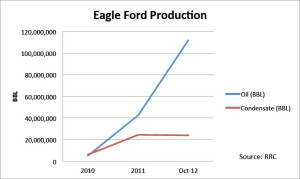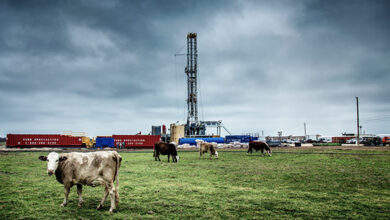Study: Impact of Eagle Ford Shale tops $61 billion in 2012

The 2012 Eagle Ford Shale estimated total economic output impact was more than $61 billion in South Texas, which is more than double the economic impact the year before – $25 billion in 2011, according to a study by the Center for Community and Business Research at the University of Texas at San Antonio Institute for Economic Development. Communities throughout South Texas are benefitting from significant economic impacts from natural gas and oil development in the Eagle Ford Shale, including benefits from related infrastructure and ancillary industries spurred by energy development.
In 2012, impacts were assessed for a 20-county region, which includes the 14 counties directly involved in natural gas and oil production, as well as the six surrounding counties indirectly supporting production. Over the last four years since Petrohawk Energy Corp drilled the first well in Eagle Ford Shale, natural gas and oil production has consistently exceeded year-over-year expectations. In 2011, given continued low natural gas prices and high oil prices, operators shifted focus to zones rich in oil, natural gas liquids and condensate. As a result, in 2012, natural gas production in the shale experienced a slight decline, and oil production increased significantly – from 5 million bbls in 2010, to approximately 128 million bbls in 2012.
Estimated economic impacts for 2012 are based on annual natural gas and oil production data from the Texas Railroad Commission, pricing information from the Energy Information Administration, estimated drilling and completion costs, and estimated royalty and lease payments.
The economic benefits extend beyond the well pad and throughout the communities at large:
- Lease payments – Reported to range widely and as high as $5,000/acre, lease payments provided approximately $2.2 million in revenues and $1.3 million in gross regional product.
- Royalties – Royalties serve as an important source of income to the owners of mineral-producing properties. Royalty payments generated $185.5 million in total output impact and supported close to 1,512 jobs.
- Sales taxes – Sales taxes continued to rise in 2012, creating a wave of revenue for local communities. From Q2 2009 to Q2 2012, amounts subject to sales tax in the 14 counties had grown from $751.9 million to $1.2 billion, a 68.2% increase in three years. McMullen County showed the most significant increase between the Q2 2009 and Q2 2012 at 1,243.7%.
- Right-of-way payments – Right-of-way payments are those made by a pipeline operator to a landowner for the use of a strip of land that runs over and around a pipeline carrying natural gas, crude or other hydrocarbons. In 2012, $192 million right-of-way payments were made resulting in an economic output of $5.8 million and $3.5 million in total gross regional product. These payments also supported 47 full-time jobs.
Analysts, investors and industry experts agree that the Eagle Ford’s high-reservoir quality, ideal location to markets, existing and planned infrastructure, and proximity to the Gulf Coast all make the it one of the world’s premier natural gas and oil plays in 2012 and beyond. Eagle Ford Shale by 2022 under moderate estimates for the 20 counties is expected to:
- Account for $89.5 billion in total economic output (or revenue);
- Support 127,919 full-time jobs;
- Pay $6.5 billion in salaries and benefits for workers;
- Contribute $41.8 billion in gross regional product (value added);
- Add $2.2 billion in state revenues; and
- Provide $2.1 billion in local government revenues.




